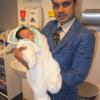NICE have issued new guidance highlighting the importance of measuring high blood pressure in pregnant women. This follows news earlier in the year that compared the safety of child birth in different countries and pointed out that it was more dangerous to give birth in the United States than it was in Beirut, mostly due to the dangers of undetected and untreated high blood pressure (hypertension) and pre-eclampsia.
About hypertension
Hypertension includes the following conditions: Chronic hypertension. Hypertension that is present at the booking visit or before 20 weeks or if the woman is already taking antihypertensive medication when referred to maternity services. It can be primary or secondary in aetiology (i.e. there in the first place, or subsequent to becoming pregnant). Gestational hypertension. New hypertension presenting after 20 weeks without significant proteinuria. Pre-eclampsia. New hypertension presenting after 20 weeks with significant proteinuria Severe pre-eclampsia. Pre-eclampsia with severe hypertension and/or with symptoms, and/or biochemical and/or haematological impairment. Eclampsia. A convulsive condition associated with pre-eclampsia. HELLP syndrome. Haemolysis, elevated liver enzymes and low platelet count. Significant proteinuria. This is when the urinary protein:creatinine ratio is greater than 30 mg/mmol or a validated 24-hour urine collection result shows greater than 300 mg protein. In addition, the guideline also defines mild, moderate and severe hypertension as: Mild hypertension - diastolic blood pressure 90–99 mmHg, systolic blood pressure 140–149 mmHg. Moderate hypertension - diastolic blood pressure 100–109 mmHg, systolic blood pressure 150–159 mmHg. Severe hypertension - diastolic blood pressure 110 mmHg or greater, systolic blood pressure 160 mmHg or greater. There are a number of factors which increase the risk of hypertension during pregnancy. These are categorised into moderate and high risk factors. Moderate risk factors include:
- A first pregnancy
- Older mothers-to-be (aged over 40 years)
- A Body Mass Index (BMI) over 35 at first antenatal visit
- A family history of pre-eclampsia
- Multiple pregnancy
Women at high risk of developing hypertension may have been previously diagnosed with hypertension during an earlier pregnancy or have a condition which may cause hypertension, such as chronic renal disease or diabetes. Celebrities who have experienced a form of hypertension while pregnant include Sophie Ellis-Bextor, Melinda Messenger, Jane Seymour and Darcey Bussell CBE. They all developed pre-eclampsia during at least one of their pregnancies.



